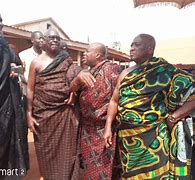
The chieftaincy dispute in Berekum has taken a dramatic turn as the Berekum Traditional Council has firmly rejected the installation of a new chief, despite Otumfuo Osei Tutu II’s involvement in the process. The rejection has intensified tensions in the Bono Region, where chieftaincy matters have long been a source of controversy and legal battles. The Berekum Traditional Council, led by the Berekum Kontihene, has openly declared that they do not want a new chief at this time, citing concerns over the legitimacy of the selection process and the broader implications for traditional governance in the region.
The rejection is seen as a direct challenge to Otumfuo’s authority, as he was expected to oversee the installation of the new chief. The dispute has been brewing for months, with factions within Berekum expressing dissatisfaction with the selection process. Some elders and royals argue that the nomination did not follow proper customary procedures, while others believe that external influences have played a role in the decision-making. The rejection of the new chief has led to heightened tensions, with some fearing that the situation could escalate into a full-blown chieftaincy crisis.
The complexity of the issue is further compounded by recent court rulings that have impacted the chieftaincy dispute. A Sunyani High Court previously issued an injunction preventing Dormaahene from attending the funeral rites of the late Berekumhene, Daasebre Dr Amankona Diawuo II, citing concerns over potential clashes between traditional authorities. The legal battles surrounding Berekum’s chieftaincy affairs have further deepened divisions within the Bono Region. The court’s intervention has added another layer of complexity to the dispute, making it challenging to find a resolution that satisfies all parties involved.
Otumfuo Osei Tutu II has called for calm amid the ongoing dispute, urging all parties involved to exercise patience while the matter is resolved. However, the rejection of the new chief raises questions about the future of Berekum’s traditional leadership and whether Otumfuo’s authority will be challenged further. The situation remains volatile, with various stakeholders holding different views on how to move forward. As the situation unfolds, all eyes remain on the next steps—whether the rejected chief will challenge the decision, whether Otumfuo’s influence will shape the outcome, and whether the courts will intervene further in the matter.
The unfolding events will undoubtedly have lasting implications for the region’s governance and traditional authority. The outcome of this dispute will set a precedent for how chieftaincy matters are handled in the future, not just in Berekum but potentially across the region. It will also test the authority of Otumfuo Osei Tutu II and the resilience of Ghana’s traditional governance structures in the face of internal conflicts and external pressures. As stakeholders navigate this complex situation, finding a balance between tradition, legality, and peace will be crucial to resolving the dispute and ensuring the stability of the Berekum Traditional Area.
The situation highlights the importance of adhering to customary procedures and ensuring that all stakeholders are involved in the decision-making process when it comes to chieftaincy matters. It also underscores the need for effective communication and conflict resolution mechanisms to prevent disputes from escalating into full-blown crises. Ultimately, the resolution of this dispute will require a nuanced understanding of the complex interplay between tradition, law, and politics in Ghana’s chieftaincy institutions.
Story by: Ohemaa Adusi-Poku


